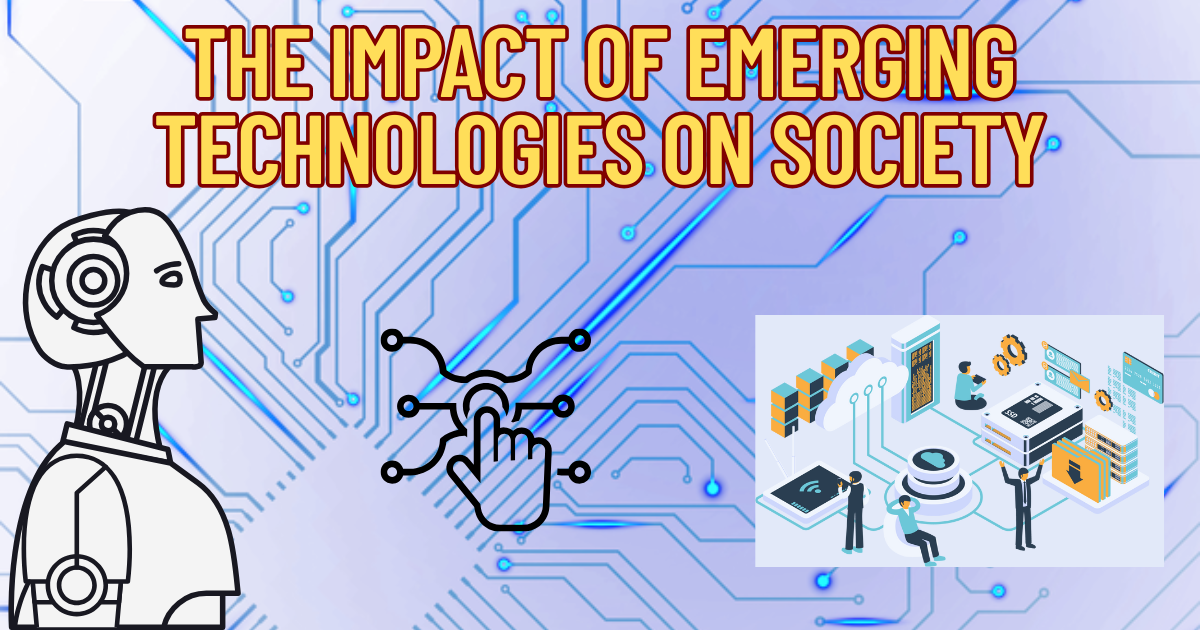The Impact of Emerging Technologies on Society: AI, Robotics, and Beyond. Emerging technologies are rapidly evolving in the present era, and they have had a huge impact on our society. It is important to understand the complex nature of these technologies and their challenges or benefits for society. To know more about the topic “The Impact of Emerging Technologies on Society: AI, Robotics, and Beyond”, read the complete article.
The Impact of Emerging Technologies on Society: AI, Robotics, and Beyond
Emerging technologies are capable of reshaping society in various ways. From artificial intelligence to blockchain and robotics to genetic engineering, these technologies are rapidly advancing, and their impact on society is becoming increasingly profound. AI and robotics are used to enhance the speed and productivity of work that can be done by a human. But there is a lot of information and instances due to which people believe that AI will take over the world. However, there is no proper statement about it, as the human brain is more capable at present.

Technology has played a significant part in developing the modern world, from the development of the wheel to the most recent advances in artificial intelligence. Technology has made our lives simpler, more productive, and more interconnected as a result of technological advancements. The robotics has transformed the field of healthcare by revolutionizing medical procedures, treatment, and diagnosis. Today, AI is used in almost every field and is modifying the procedures and increasing knowledge.
Artificial Intelligence (AI)
Increased Productivity and Efficiency: Artificial Intelligence (AI) is used in various activities to automate tasks, analyze large datasets quickly, and make better decisions, which leads to increased productivity. AI does the task more efficiently without much human effort. Also, AI will stand in between individuals, as the individual gathering will now not be required for communication.
Improved Healthcare: With better monitoring and diagnostic capabilities, AI can significantly influence healthcare. By improving the operations and procedures of healthcare facilities and medical organizations, AI can reduce operating costs and save money.
Transforming Education: Online learning platforms, virtual reality, and augmented reality are revolutionizing traditional classroom settings, making education more accessible, engaging, and personalized. AI helps students in various ways to get a detailed education.
Robotics
Improved Automation: Automatic devices that can carry out certain tasks are the focus of robotics research. Several industries could benefit from the use of robotics, including construction, medicine, and transportation.
Exploration: AI-powered robots support missions to the Moon, Mars, and beyond, helping with both exploration and the establishment of sustainable habitats. Also, space tourism, once unthinkable, will soon become a reality, providing unforgettable experiences to individuals seeking adventure outside our planet.
Better Lifestyle: Robots can perform household chores, prepare meals, and provide assistance to individuals with disabilities, offering greater independence and convenience.
Beyond AI and Robotics
Internet of Things (IoT): There has been a lot of success with the IoT in automating homes, controlling energy usage, and improving transportation. The Internet of Things (IoT) is now pervasive and has its devices collect and share data, resulting in automation and better decision-making.
Blockchain: Blockchain can be helpful in assisting government work smarter and innovate faster. In addition to offering an unchangeable audit trail for regulatory compliance, contact management, identity management, and citizen services, secure data sharing between citizens and agencies can boost trust.
Biotechnology: Medicine, farming, and even power generation are just some of the many fields that might benefit from biotechnology. Biotechnology is positioned to become more and more involved in people’s lives in the years to come as new treatments and cures for illnesses are found.
Challenges
Social Isolation: If the use of AI and robotics continues to rise, it may reduce social interaction between humans. People will become dependent on AI and it will lead to social isolation.
Job Displacement: AI and Robotics are known to work better than humans, which will lead to humans losing their jobs, especially in manufacturing and other sectors with repetitive tasks.
Privacy Concerns: Increase in the reliance on AI and robotics in everyday activities is helpful, but the chances of data theft, data breaching, and privacy concerns will increase.
Wealth Inequality: Wealth inequality will be created as the investors of AI will take up the major share of the earnings. The gap between the rich and the poor will be widened.